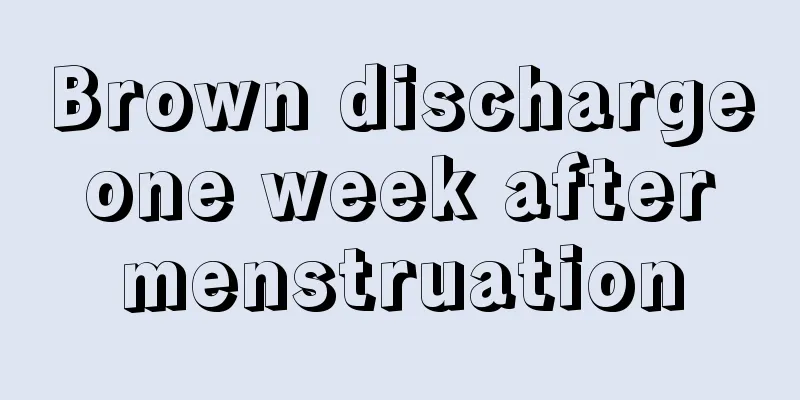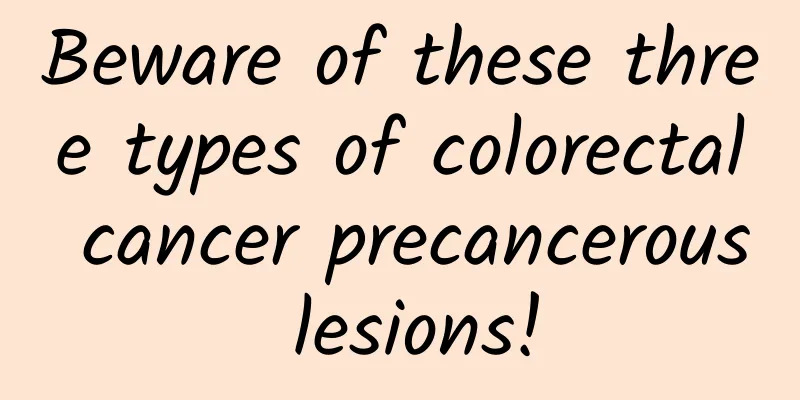Brown discharge one week after menstruation

|
When women reach those "few days", their bodies will always experience many discomforts, which will be greatly affected in both their daily life and work. Finally, until the menstrual period is over, I thought, "I can finally relax now", but I never thought that new troubles would arise. Many girls continue to have brown discharge after their period ends, sometimes even with a strong odor. It is said that secretions are a major indicator of female reproductive health, so what is the reason for brown discharge after the menstrual period? What causes brown discharge? The brown discharge that appears a few days after a woman's menstruation ends may be caused by two situations: one is ovulation bleeding, and the other is abnormal discharge caused by gynecological diseases. If it is ovulation bleeding, as long as the amount is not too much, it is not a big problem. If the brown discharge is caused by non-ovulatory bleeding, it may be caused by vaginitis or cervical erosion. You need to go to the hospital for a gynecological examination and use medication after diagnosis. So how do you know whether the brown discharge is caused by ovulation bleeding or gynecological disease? It's very simple. Just record the time when the brown discharge appears. Ovulation usually occurs 12-16 days after the next menstrual period. If brown discharge only occurs during this time period, it means that it is only ovulation bleeding. How to recuperate after one week? 1. Moderate fitness exercise Many women do not want to move during menstruation because they feel uncomfortable, but they should move quickly after the menstrual period is over, otherwise it will be bad for their health. It should be noted that it is not advisable to carry out high-intensity aerobic exercise to lose weight immediately after the menstrual period ends. You should relax, do relaxing exercises such as yoga, etc. 2. Make sure you take breaks During the menstrual period, you may not eat well or sleep well due to factors such as menstrual pain, so you should take good care of yourself after the menstrual period. Get up early and go to bed early, stare at the computer less, avoid working overtime if possible, and give your body enough rest days, so that you will have more sufficient experience to deal with life and work the next day. 3. Eat nutritious ingredients Eating nutritiously does not mean eating chicken, duck, fish and meat, but a balanced supplement of fruits, meat and vegetables. It is recommended to eat more tender meat, dark green vegetables, and warm fruits. These foods are rich in protein, minerals and vitamins, which are very beneficial to women after menstruation. |
<<: Brown color on the first two days of menstruation
Recommend
What is uterine cavity separation? Teach you how to treat uterine cavity separation
Uterine cavity separation is a special term for B...
Caring for Tang Bao and helping him recover
What is Down syndrome? Down syndrome is a genetic...
What causes cerebral infarction? Does it have anything to do with anger? Can emotional fluctuations and anger cause cerebral infarction?
Cerebral infarction is generally caused by brain ...
Precautions for vulvar itching and pain
What people want most in life is to have a health...
Less bleeding after uterine curettage
Uterine curettage, also known as abortion, is a w...
How to solve postpartum vertebral pain
Postpartum vertebral pain is a big problem that m...
Is presbyopia the same as cataract? How to relieve cataract and low vision?
Cataracts, like presbyopia, are common in the eld...
Granular cervical erosion
Cervical erosion is a very common gynecological d...
What should I do if a girl has a mustache on her mouth?
I believe everyone is familiar with the symptom o...
Can I have induced labor at 34 weeks of pregnancy?
As we all know, there is no difference between ab...
How long after ovulation can you have sex to get pregnant
It is still possible to get pregnant after having...
Can I take medicine during my period?
Girls often have such a few days every month. If ...
What are the symptoms of pelvic blood circulation?
Pelvic blood circulation plays a vital role in wo...
Is it better to perm curly hair cold or hot?
For many women, they prefer perming. Perming is m...
What should I do if I have milk knot pain during lactation?
Women who are breastfeeding are very prone to mil...









